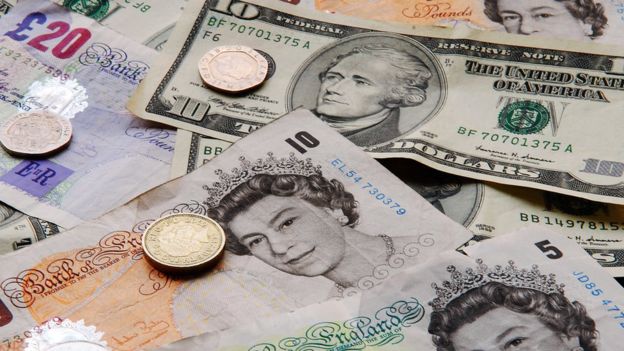The pound has dived on Asian markets with automated trading being blamed for the volatility.
At one stage it fell as much as 6% to $1.1841 – the biggest move since the Brexit vote – before recovering to $1.23, still down 1.5%.
It is not clear what triggered the sudden sell-off. Analysts say it could have been automated trading systems reacting to a news report.
The pound has been volatile since the UK voted to leave the European Union.
The sharp drop came after the Financial Times newspaper published a story online about French President Francois Hollande demanding “tough Brexit negotiations”.
“It’s difficult to know exactly what triggered it,” Angus Nicholson, market analyst with IG in Melbourne, told the BBC.
Analysts think the situation could have been exacerbated by trading algorithms – software which is designed to trade automatically and can react much faster than human traders.
Chain reaction
“Possibly a keyword or newsflow-focused algorithm started the selling in the pound based on that article, and other algorithms may have seen the volume and momentum coming into the pound at what is normally a relatively low volume time,” Mr Nicholson said.
A computer may have been set to scan the news for negative Brexit stories, with the order to sell if it found any.
“That may have brought in other algorithms which compounded the selling creating a feedback loop that resulted in a flash crash,” Mr Nicholson explained.
The incident happened at a time when there is very little pound trading going on – which means that any sell-off will have a bigger impact than during busy hours.
“It’s a very volatile currency at the moment,” Mr Nicholson said.
Last Sunday, the Prime Minister Theresa May said she would trigger Article 50, the clause needed to start the exit process, by the end of March 2017.
Sterling has been “on a precipice” since then, according to Sean Callow, senior currency strategist at Australian bank, Westpac.
“I think we’ve underestimated how many people had money positions for a very wishy-washy Brexit, or even none,” he said.
Interconnected world
Even though the pound recovered ground immediately after the flash crash, Friday’s tumble might still have a broader impact.
“In this deeply interconnected and highly automated world of trading, a move as sharp as what we saw this morning on a product as widely traded as the Sterling will almost certainly lead to unintended consequences for many,” said Nicholas Teo of KGI Securities in Singapore.
Unlike after the Brexit vote in June, markets were not prepared for any sudden moves this Friday.
“What could follow next, is a period of reconciliation and accountability for many brokers and their clients’ accounts,” Mr Teo wrote.

